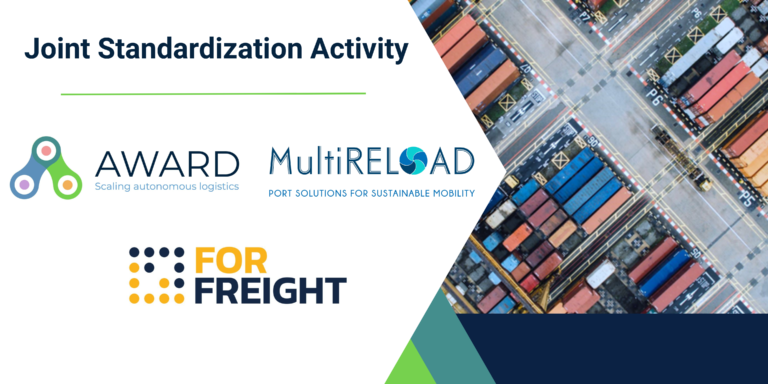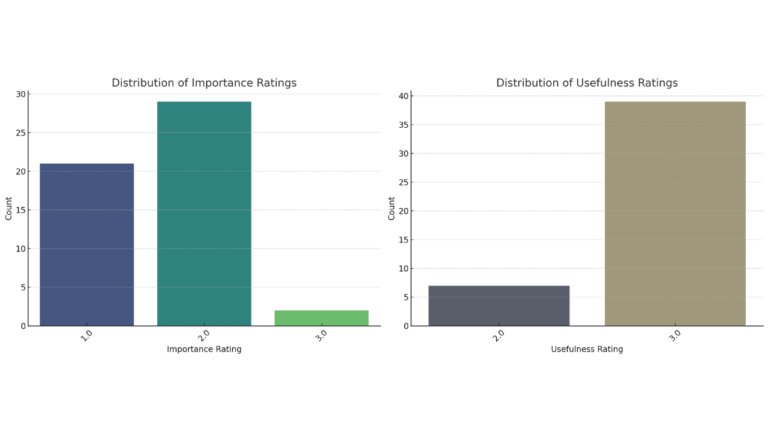Joint Standardization Activity: AWARD, FOR-FREIGHT and MultiRELOAD

At the heart of technological innovation and sustainable development, collaboration and standardization play key roles. This truth echoes vividly through the exemplary Joint Activity among three avant-garde European projects: AWARD, FOR-FREIGHT, and MultiRELOAD. A joint venture that not only illuminated the path to effective standardization but also demonstrated the power of unity and strategic collaboration. Our goal was straightforward yet ambitious: identify and analyze the most commonly used standards across our three projects, with a keen eye on the importance and utility of each. This collaborative process brought to light common standard practices and offered a platform for evaluating and discussing our march towards innovation and efficiency.
Standards at the Core
In the fabric of our collaborative endeavor among the European projects AWARD, FOR-FREIGHT, and MultiRELOAD, the identification and analysis of core standards stand as a testament to our commitment to interoperability, efficiency, and innovation. The ISO/IEC 21778:2017 and Datex II standards exemplify the technological backbone of our projects, offering frameworks that support the seamless integration of digital systems and the facilitation of data exchange. These standards not only underpin the technical foundation of our work but also embody the principles of open communication and shared best practices.TIC4.0 emerges as a particularly illuminating example, symbolizing our dedication to fostering a digitalized and interconnected industrial landscape. This standard is not merely a set of guidelines but a beacon guiding the terminal industry towards a future where digital processes are streamlined and optimized for greater sustainability and productivity. It underscores the potential of digital transformation to catalyze change and drive the industry forward, highlighting the crucial role of standards in facilitating this transition.
Furthermore, our exploration revealed a diverse array of standards, including those from IATA, UIC, and various UN ECE R regulations, which serve as critical pillars for safety, efficiency, and environmental stewardship. These standards not only ensure compliance with international norms but also foster a culture of continuous improvement and innovation. Our analysis delved into the importance and utility of these standards, uncovering their vast applicability across the projects. For instance, the CENELEC JTC21 and VDE-AR-E 2842-61 standards, while less commonly discussed, play significant roles in addressing specific technical challenges and advancing the state of the art. This nuanced exploration of standards not only highlighted their individual contributions but also underscored the collective synergy that arises from their integration into our projects.
Here are the graphical representations showing the distribution of standards based on their importance and usefulness ratings:
- The first graph (on the left) displays the distribution of importance ratings, indicating how many standards received each possible rating of importance.
- The second graph (on the right) shows the distribution of usefulness ratings, highlighting the number of standards assigned to each level of usefulness.

By focusing on the intersectionality of these standards, our collaborative effort goes beyond mere compliance; it is a proactive embrace of standardization as a catalyst for innovation, efficiency, and cross-project synergy. This approach underscores the complexity of our mission, where standardization is not an endpoint but a dynamic, ongoing process that adapts and evolves in response to new challenges and opportunities.
Future Perspectives
The Joint Activity between AWARD, FOR-FREIGHT, and MultiRELOAD marked a significant chapter in our joint journey towards excellence in research and innovation. This initiative not only laid the groundwork for closer collaboration but also highlighted how knowledge sharing and standardization can act as catalysts for innovation.
Looking ahead, we are filled with optimism about the opportunities that emerge from this collaboration. It’s evident that our joint commitment to standardization is not merely a matter of adhering to common guidelines but is a crucial step towards achieving broader goals of innovation, sustainability, and collective success.
Innovating Port Logistics Operations: An Interactive Symposium on Automation and Digitalization
Don't miss our Joint virtual symposium between AWARD, FOR-FREIGHT and MultiRELOAD, register now!
Click Here